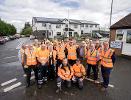Morrison Busty project
Completed in 2023, this major European Regional Development Fund (ERDF) funded project is a cornerstone of our depot and fleet decarbonisation efforts.
Morrison Busty has combined significant building retrofit with insulation alongside a total redesign of the heating system to incorporate air source heat pumps. Fleet decarbonisation is supported through the installation of EV charging posts which will allow vehicles based in north Durham to convert and charge easier. The whole site is powered by a large 3MW solar farm alongside battery technology. This generates surplus power during the day which is then stored for the heating and fleet charging overnight. We have already realised significant monetary and carbon savings since installation.
The site is located just south of Annfield Plain and started its life as the Morrison Busty Colliery in the late 1920s. The site initially opened as an active pit, employing 1,500 people until it closed its gates in 1973. It is now owned by the council and since late 2019 has been having significant improvements to the buildings and infrastructure with the aim of reducing emissions across the site to zero. In June, the depot fully reopened with a brand-new look, climate friendly additions and low-carbon facelift.
Project timeline
2019
- £5 million ERDF (European Regional Development Funding) secured for the project
- £3 million council invest to save funding secured
2021
- April - appointed a specialist contractor to do the work
- May - the final stages of design, work with ecology consultants
- June - construction started
- July - demolition of some colliery buildings
- Autumn/winter - offices received a thermal upgrade
2022
- Work on solar farm, charging points and battery storage
- Work on new vehicle workshop begins
- Natural environment enhancements commence with new pond and nest boxes
2023
- April - practical completion
What has been done
The Morrison Busty site has been transformed into a low-carbon hub through the following initiatives:
- Installation of a 3MW solar photovoltaic farm and a battery capable of storing 2MWh of energy, meeting the site's electricity needs.
- Installation of rapid electric vehicle charging points for the council's fleet.
- Thermal upgrades to two existing buildings, including external wall insulation, improved glazing, and upgraded roof insulation.
- Replacement of natural gas boilers with air source heat pumps.
- LED lighting upgrades across the site, with dimming and wireless control capabilities.
- Development of a private wire network to transport solar-generated electricity to the depot and EV charging points.
This project was recognised as a finalist in the national Association of Public Service Excellence Awards, in the Best Climate Action and Decarbonisation Initiative category. It stands as one of the council's most significant achievements, paving the way to net zero and setting a strong example for the rest of the county.

In partnership with
- Climate County Durham






 Share this page on Facebook
Share this page on Facebook
 Share this page on Twitter
Share this page on Twitter
 Print this page
Print this page





